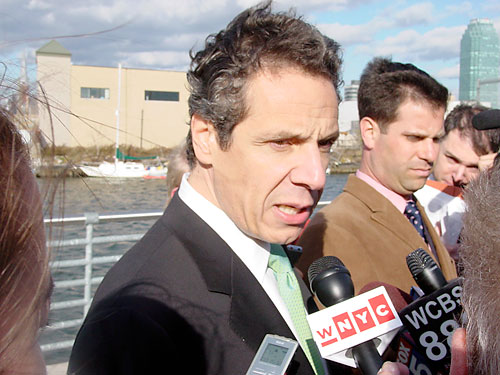Less than a week after the state reached a historic $25-million settlement with ExxonMobil, forcing the company to finish cleaning up the Greenpoint oil spill, residents are questioning whether those funds will go far enough to repair six decades of pollution.
“It’s small,” said Greenpoint resident Mike Hofmann. “They made $11.5 billion in one quarter a few years ago and we get $25 million? That’s crazy.”
The largest environmental settlement in state history, announced by Attorney General Andrew Cuomo on Nov. 18, abruptly ended a six-year legal battle between environmental groups, public officials and ExxonMobil over responsibility for cleaning up an estimated 17 million gallons of oil that leached into 55 acres of Greenpoint soil and groundwater for half a century.
State suits against other oil companies situated along Newtown Creek, such as Phelps Dodge, National Grid, BP, and Chevron-Texaco, are pending.
Other Greenpoint residents want the company to go further and not forget about the health and welfare of residents who have lived above the oil plume for decades.
“[The state] hasn’t been able to make a direct link to health issues, oil spill and pollution, strange as it may seem,” said Rich Mazur, an area developer. “Exxon is liable to clean up oil spill and the soil but not take care of the people who have gotten sick because of it.”
The size of the settlement also troubled some environmentalists, who pointed out that government lawyers preparing the case against BP for the Gulf Oil spill are talking about fines between $4.5 and $17.6 billion. If a similar penalty was assessed against ExxonMobil for the Greenpoint spill, the range would be $445 million to $1.7 billion, depending on the level of negligence determined in court.
“How did Exxon get away with a $25-million penalty?” a group called Neighborhood Roots said in a statement. “When state lawyers were negotiating a settlement before [Cuomo] took the case away, the settlement was closer to $200 million. The elected officials should be ashamed of themselves for agreeing to such a miniscule settlement.”
Councilman Steve Levin (D–Greenpoint) disagreed, saying that ExxonMobil would be held to the “highest appropriate liability for its negligence,” adding, “It is my hope that the compensation from this settlement will be far reaching enough to improve the lives of everyone who lives, works, and visits Greenpoint.”
Skepticism aside, many environmental advocates praised the deal resolving the lawsuit, calling it the best outcome for the Greenpoint community because a lengthy trial could have stalled in court indefinitely — even if the result would have been a slightly higher financial settlement.
Indeed, in the case of the Exxon Valdez, which dumped 10 billion gallons of oil into pristine Alaskan waters in 1989, an initial $5-billion punishment against the oil company evaporated into a $500-million judgement on appeal — and wasn’t finalized until 2009.
“Our goal from the beginning of bringing our lawsuit was to compel Exxon to clean up the site and compensate the community for the damage,” said Philip Musegaas of Riverkeeper, an environmental watchdog that first filed suit in 2004. “We’ve fought very hard for the settlement we’ve got and we’re happy with the settlement we have.”
A spokeswoman for ExxonMobil declined to address how the settlement was reached or how much the removal of pollution will cost the company, which has not been disclosed publicly. She did say that the agreement goes beyond previous ones which required an initial removal of oil obligating the company to address all “soil, groundwater, soil vapor and air concerns,” with additional oversight from the state.
“Complex remediation projects such as Greenpoint, where petroleum products are underground and not easily accessed — take time to complete, said the spokeswoman, Kristin Hellmer. “ExxonMobil is committed to remain in Greenpoint until the remediation effort is done — and done right.”
Exxon’s settlement only applies to the removal of oil from underground — not to costs incurred from the federal government’s Superfund designation for Newtown Creek or any health-related consequences that pollution has caused over generations. Those lawsuits are still in court and the state retains its right to sue on matters regarding the creek in the future.
The settlement will not only require the company to achieve several benchmarks for removing pollutants and report on its progress under the court’s supervision but also pay $19.5 million to fund environmental projects that will benefit the Greenpoint community — although the company did not acknowledge culpability for the contamination.
The environmental benefits package of $19.5 million is roughly double the total amount that Greenpoint received from the city’s 2008 settlement with the state for violating pollution laws and failing to upgrade its $4-billion sewage plant on a timely schedule.






















